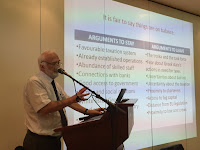The Euro
crisis has turned into one of the most serious challenges that the European
Union (EU) has had to face so far. At its root the crisis is a
balance-of-payments crisis; caused by divergent economic developments among
member states in the pre-crisis years and the deep financial integration that
accompanied this process.
Monday, 14 December 2015
Who Controls the IMF?
The International Monetary Fund (IMF, or
Fund) is governed by its member countries. Its daily business is conducted by a
24-member Executive Board, its directors representing countries, or groups of
countries. Importantly, at the IMF, not all countries are the same – instead,
so-called weighted voting governs the Fund. The “weight” of a country is
determined by its economic importance, depending on variables like GDP, trade,
and reserves of foreign currency. The resulting vote share of the United
States, the single largest shareholder of the Fund, exceeds 17 percent. Japan
and Germany follow, with around 6 percent each, then the United Kingdom and
France with each around 5 percent of the voting weight. Most decisions at the
Fund have to be taken with a majority of more than 50 percent (though formal
votes are rarely taken), giving these few countries a substantial say in
decision-making at the Fund.
Economic Consequences from the Enforcement of Deflationary Policies in Greece and the Case of Greek Shipping
"La democracie c' est s’addresser a l’intelligence des citoyens plutot que d’exciter leur peurs."
Francois Hollande, October 2015
The underlying intention of this presentation has been to provide an answer to the apparent inconsistency between the declared objective of assisting the Greek economy go back to economic development and the means presently employed to achieve this. The ailing Greek economy has been obliged to undergo a severe austerity programme over a lengthy period at a time of world recession as a precondition for receiving economic facilitation to stay in the Eurozone and return to economic development.



